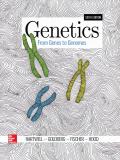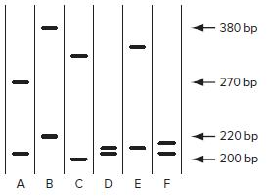
EBK GENETICS: FROM GENES TO GENOMES
6th Edition
ISBN: 9781260041255
Author: HARTWELL
Publisher: MCGRAW HILL BOOK COMPANY
expand_more
expand_more
format_list_bulleted
Concept explainers
Textbook Question
Chapter 11, Problem 16P
The trinucleotide repeat region of the Huntington disease locus (HD) in six individuals is amplified by PCR and analyzed by gel electrophoresis as shown in the following figure; the numbers to the right indicate the sizes of the PCR products in bp. Each person whose DNA was analyzed has one affected parent.
| a. | Which individuals are most likely to be affected by Huntington disease, and in which of these people is the onset of the disease likely to be earliest? |
| b. | Which individuals are least likely to be affected by the disease? |
| c. | Consider the two PCR primers used to amplify the trinucleotide repeat region. If the 5′ end of one of these primers is located 70  |
Expert Solution & Answer
Want to see the full answer?
Check out a sample textbook solution
Students have asked these similar questions
What are functions of cuboidal cells in the kidney? Select all that apply.
Concentration of gases
Dilution of chemicals
Secretion of molecules
Nutrition to tissues
Support of tissues
Absorption of molecules
question1 In plants, epithelial tissue is only found as the outermost cell layer and acts as a barrier. In humans, epithelial tissue is found inside the body as well as on the surface.
What function(s) does/do epithelial tissue carry out in humans? Select all that apply.
Waste storage
Filtration
Oxygen transport
Protection
Diffusion
Osmosis
Absorption
What words best describes this organism?
a. Unicellular/nonmotile
Ob. unicellular/motile
c. colonial/nonmotile
d. colonial/motile
e. multicelluar
O f. siphonous
g. none of these
Chapter 11 Solutions
EBK GENETICS: FROM GENES TO GENOMES
Ch. 11 - Choose the phrase from the right column that best...Ch. 11 - Would you characterize the pattern of inheritance...Ch. 11 - Would you be more likely to find single nucleotide...Ch. 11 - A recent estimate of the rate of base...Ch. 11 - If you examine Fig. 11.5 closely, you will note...Ch. 11 - Approximately 50 million SNPs have thus far been...Ch. 11 - Mutations at simple sequence repeat SSR loci occur...Ch. 11 - Humans and gorillas last shared a common ancestor...Ch. 11 - In 2015, an international team of scientists...Ch. 11 - Using PCR, you want to amplify an approximately 1...
Ch. 11 - Prob. 11PCh. 11 - The previous problem raises several interesting...Ch. 11 - You want to make a recombinant DNA in which a PCR...Ch. 11 - You sequence a PCR product amplified from a...Ch. 11 - Prob. 15PCh. 11 - The trinucleotide repeat region of the Huntington...Ch. 11 - Sperm samples were taken from two men just...Ch. 11 - Prob. 18PCh. 11 - a. It is possible to perform DNA fingerprinting...Ch. 11 - On July 17, 1918, Tsar Nicholas II; his wife the...Ch. 11 - The figure that follows shows DNA fingerprint...Ch. 11 - Microarrays were used to determine the genotypes...Ch. 11 - A partial sequence of the wild-type HbA allele is...Ch. 11 - a. In Fig. 11.17b, PCR is performed to amplify...Ch. 11 - The following figure shows a partial microarray...Ch. 11 - Scientists were surprised to discover recently...Ch. 11 - The microarray shown in Problem 25 analyzes...Ch. 11 - The figure that follows shows the pedigree of a...Ch. 11 - One of the difficulties faced by human geneticists...Ch. 11 - Now consider a mating between consanguineous...Ch. 11 - The pedigree shown in Fig. 11.22 was crucial to...Ch. 11 - You have identified a SNP marker that in one large...Ch. 11 - The pedigrees indicated here were obtained with...Ch. 11 - Approximately 3 of the population carries a mutant...Ch. 11 - The drug ivacaftor has recently been developed to...Ch. 11 - In the high-throughput DNA sequencing protocol...Ch. 11 - A researcher sequences the whole exome of a...Ch. 11 - As explained in the text, the cause of many...Ch. 11 - Figure 11.26 portrayed the analysis of Miller...Ch. 11 - A research paper published in the summer of 2012...Ch. 11 - Table 11.2 and Fig. 11.27 together portray the...Ch. 11 - The human RefSeq of the entire first exon of a...Ch. 11 - Mutations in the HPRT1 gene in humans result in at...Ch. 11 - Prob. 44P
Knowledge Booster
Learn more about
Need a deep-dive on the concept behind this application? Look no further. Learn more about this topic, biology and related others by exploring similar questions and additional content below.Similar questions
- Identify the phylum or class. a. Euglenophyta b. Dinoflagellata c. Bacillariophyceae d. Oomycetes e. Phaeophyceae O f. Myxomycota g. Xanthophyceae ○ h. Chrysophyceae i. Dictyosteliomycota O j. Rhodophyta Ok. Chlorophyceaens I. Charophyceaensarrow_forwardWhat is produced inside the indicated structure (Fucus). a. eggs O b. antheridia ○ c. sperm d. zygotes e. none of thesearrow_forwardGreen Algae, as a group, is actually paraphyletic with one subgroup more closely related to higher plants than the other. Which of the following green algae groups is more closely related to higher plants: a. Charophyceans b. Chlorophyceans c. Rhodophyta d. Xanthophyceansarrow_forward
- A single-celled green algal genus that is motile with 2 flagella, has a cup shaped chloroplast, and an eyespot: a. Volvox b. Chlamydomonas c. Euglena d. Codiumarrow_forwardA[n] ___ is produced by members of the Myxomycota when there is a lack of moisture. a. plasmodiocarp b. aethalium c. sclerotium d. plasmodiumarrow_forwardWhich of the following is not true about the life-cycle of Fucus. a. 8 eggs per oogonium b. 64 sperm per antheridium c. eggs are flagellated d. sperm are flagellatedarrow_forward
- Green Algae, as a group, is actually paraphyletic with one subgroup more closely related to higher plants than the other. Which of the following green algae groups is more closely related to higher plants: a. Charophyceans b. Chlorophyceans c. Rhodophyta d. Xanthophyceansarrow_forwardCertain toxic terpenoids in this group is thought to deter herbivory but may also have some anti-tumor activity? a. green algae b. brown algae c. red algae d. golden algae e. none of thesearrow_forwardIn the cellular slime molds, the most common phase is: a. plasmodium b. pseudoplasmodial c. single cells as myxamoebae d. moundingarrow_forward
- Which of the following descriptive terms does not describe Hydrodictyon? a. colonial b. nonmotile c. 1 large reticulated chloroplast in each cell d. all of these describe Hydrodictyonarrow_forwardWhich of the following does not apply to Chara? a. "stoneworts" b. isogamous c. calcified walls d. apical growth with an axis and branchesarrow_forwardtell us about one time when you went the extra mile when it would be acceptable to perform the bare minimum. why did you exert the extra effort and what was the outcome?arrow_forward
arrow_back_ios
SEE MORE QUESTIONS
arrow_forward_ios
Recommended textbooks for you
 Human Heredity: Principles and Issues (MindTap Co...BiologyISBN:9781305251052Author:Michael CummingsPublisher:Cengage LearningCase Studies In Health Information ManagementBiologyISBN:9781337676908Author:SCHNERINGPublisher:Cengage
Human Heredity: Principles and Issues (MindTap Co...BiologyISBN:9781305251052Author:Michael CummingsPublisher:Cengage LearningCase Studies In Health Information ManagementBiologyISBN:9781337676908Author:SCHNERINGPublisher:Cengage Biology: The Dynamic Science (MindTap Course List)BiologyISBN:9781305389892Author:Peter J. Russell, Paul E. Hertz, Beverly McMillanPublisher:Cengage Learning
Biology: The Dynamic Science (MindTap Course List)BiologyISBN:9781305389892Author:Peter J. Russell, Paul E. Hertz, Beverly McMillanPublisher:Cengage Learning Concepts of BiologyBiologyISBN:9781938168116Author:Samantha Fowler, Rebecca Roush, James WisePublisher:OpenStax College
Concepts of BiologyBiologyISBN:9781938168116Author:Samantha Fowler, Rebecca Roush, James WisePublisher:OpenStax College Human Biology (MindTap Course List)BiologyISBN:9781305112100Author:Cecie Starr, Beverly McMillanPublisher:Cengage Learning
Human Biology (MindTap Course List)BiologyISBN:9781305112100Author:Cecie Starr, Beverly McMillanPublisher:Cengage Learning

Human Heredity: Principles and Issues (MindTap Co...
Biology
ISBN:9781305251052
Author:Michael Cummings
Publisher:Cengage Learning

Case Studies In Health Information Management
Biology
ISBN:9781337676908
Author:SCHNERING
Publisher:Cengage

Biology: The Dynamic Science (MindTap Course List)
Biology
ISBN:9781305389892
Author:Peter J. Russell, Paul E. Hertz, Beverly McMillan
Publisher:Cengage Learning

Concepts of Biology
Biology
ISBN:9781938168116
Author:Samantha Fowler, Rebecca Roush, James Wise
Publisher:OpenStax College

Human Biology (MindTap Course List)
Biology
ISBN:9781305112100
Author:Cecie Starr, Beverly McMillan
Publisher:Cengage Learning

Molecular Techniques: Basic Concepts; Author: Dr. A's Clinical Lab Videos;https://www.youtube.com/watch?v=7HFHZy8h6z0;License: Standard Youtube License